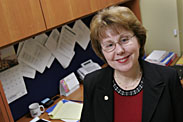In focus
Judy Dear: Giving at the office
Callers hoping to leave a message for Judy Dear on her voice mail in the evening are often surprised to find her still at her desk well past official opening hours. Between her work as administrative assistant in the Controller's Office and her Centraide involvement, Dear usually logs an extra four to five hours at the end of every workday during the Centraide campaign, and puts in another three to five hours from home during the weekend. "My husband is very supportive of all of this too, otherwise I probably wouldn't have a marriage," she laughs. "He comes and picks me up and has dinner made."

Owen Egan
Dear is calm and focused and speaks with great conviction, especially about McGill's Centraide campaign. From October through December, her life is organized around the Centraide Committee. She currently is a co-chair, with Janet Arts (incoming), Kate Maguire (outgoing) and Dean of Law Nicholas Kasirer.
"It's not a blind commitment that I've made. I have to know that the time and effort that I'm investing is wisely spent. In order to ask McGill staff to buy into it, we have to ensure the agency is honest and that they're using the donations correctly. In Centraide's case, 88 cents of every dollar go to the agencies and they provide us with financial statements that we can review." The committee often visits funded agencies, or invites presentations from groups such as Big Brothers and Big Sisters so the committee members learn about the people they are raising money for.
She says she doesn't have time to relax, but, "I don't feel stressed at all. Probably a little overtired, but I feel that once things slow down toward the end of December things will go back to normal." Dear points out that her supervisor Matthew Nowakowski has always been supportive of her Centraide work, and that has allowed her to continue her active involvement with the campaign.
One of her most memorable moments came last year when the McGill's Centraide Committee was struggling to reach its goal and then unexpectedly received $25,000 from one donor. "You can imagine the excitement when we received that cheque!" She says they also count on their regular leaders from the campaign (those who donate $1,000 or more). "We have over 50 leaders at McGill, so that helps the campaign tremendously. We depend on them."
Dear worked for 10 years as a hairdresser while her two children were young because it afforded her a flexible schedule. She says she and her husband made sure that at least one of them was always around for their kids. When her youngest was about 11 years old, Dear went back to school to study business technology to be a medical secretary.
"It was very different from what I had been doing. I had never touched a computer. I remember the first day of my course; just the thought of having to turn it on was intimidating, but once I got into it I loved it."
She came to McGill in 1998 as a student for her stage at the Biomedical Ethics Unit, and was hired to stay on as a part-time employee. She worked her way up the ranks at McGill from casual, term, permanent, to clerical, and is now at the management level. "It was a lot of hard work," she admits.
Dear is working toward a certificate in human resources but has been too busy to take a course this year. She is the chair of the Management Forum Steering Committee and explains that she has learned at least as much from her work with them as she would have in a classroom, becoming familiar with management issues through HR presentations and policy discussions.
"I've learned things about management that I would never have known unless I had served on the committee. When I first started [on the committee], it was kind of intimidating because I was the 'baby' in terms of years at McGill. By the end of the first year it was amazing how much I'd learned."
She says she is motivated by her desire to help people in the Montreal community, and by her ongoing contact with the groups that Centraide gives money to. "It's nice to participate in something that you know could be helping your neighbour, your relative or your friend."
 |
||||
|
There's no safe level of smoking for teenagers. The first puff is dangerous. |
||||
Degrees of Mutilation
It is a display to break a book lover's heart. Pages vandalized, coffee-stained and brutalized. Covers torn, faded and ripped. Post-it Notes and colourful highlights spreading like some fluorescent neon blight across entire paragraphs. Most telling, a pair of bookends stand guard over a series of book-shaped footprints bearing the marks "missing, stolen, hidden…" These are the unknown soldiers of the bibliographic world.

Owen Egan
This sad collection is contained within the library exhibit "Degrees of Mutilation," an effort to raise awareness of the damage that can be done to library holdings through carelessness or malice.
The exhibit is the work of Preservation Librarian Ann Marie Holland and dozens of library staff who collected the roughly 100 items now in the Redpath display cases. The mutilated books range from 19th-century art books to a political science text published in 1999. Each is displayed under a bold heading such as "Negligence" or "Peripheral Vice," and each sits on arresting giant red Xs. The display was designed by Jennifer Garland and Chris Kline. Donald Hogan, conservation specialist in the Rare Books and Special Collections Division, also assisted in the exhibition display.
As Holland showed this reporter around the cases, she carried the newest addition to this unfortunate collection: a shiny new hardcover book on primates, with a big pink wad of gum holding its pages together.
Holland explained that there are a number of natural enemies that books face, including bookworms, silverfish and mould, which are all attracted by foodstuffs or humidity. "Foodstuffs," in this case, could be crumbs from a muffin smuggled into the library to fuel a long night of studying. It could also be glue left by a Post-it Note.
Some books have their weaknesses built right in. A cheap bookmaking process devised in the 19th century called "perfect binding" was anything but. Books made in this manner — with the pages individally glued to the spine — will almost certainly fall apart. In fact, one perfect bound book on display, published in 1999, was in nearly as poor shape as one published a century before.
Other damage is more deliberate. One handsome volume containing "tripped in" plates (illustrations pasted on the pages of the book) was missing 30 of its 50 plates.
"This has no value anymore," said Holland.
The old and beautiful are not the only victims of such theft. The December 2003 issue of Time magazine (Canadian edition), featuring George W. Bush on the cover, has been stolen from the library several times. The library has had to reorder, reprocess and then rebind the entire 2003 volume of Time several times as a result.
Other books have been defaced or damaged for religious or ideological reasons.
One book, borrowed from Rutgers University, was thoroughly chewed up by an industrious mouse who created a little tunnel for himself through the pages. Yet another part of the display contains a book that was utterly mangled by someone's dog. The borrower did the honourable thing in returning the book to the library — complete with a bag full of those portions of the book he was able to wrestle from the canine's gullet.
"He thought we could repair it," said Holland, looking at the jumbled scraps of paper.
"We can't."
 |
||||
|
What is not shown is that most Arab and Jewish students do get along. Even those who are yelling at each other, often then sit down and have a coffee with each other afterward. |
||||
